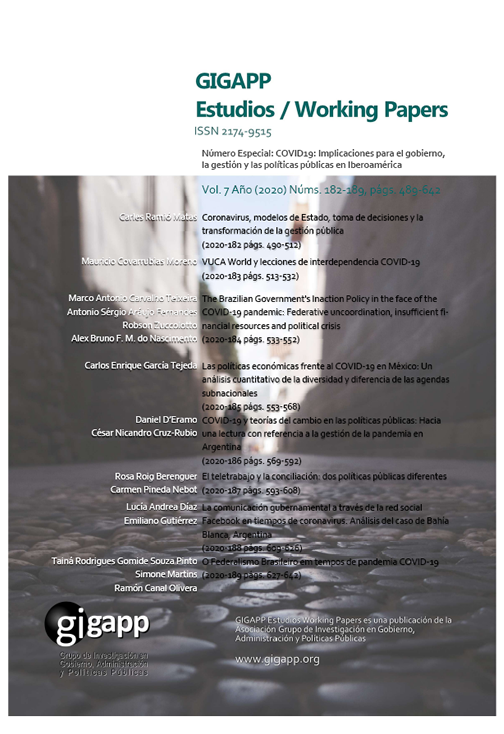The Brazilian Government's Inaction Policy in the face of the COVID-19 pandemic
Federative uncoordination, insufficient financial resources and political crisis
Abstract
This article aim show the inaction in public policy to combat COVID-19 in Brazil, making the country the second in the number of cases and second in the number of deaths in the world. This situation is due to a political choice from Federal Government that marked the decision-making process of public policies to combat COVID-19. The problem is situated in Federal Governament, and this statement is supported by the conceptual hypothesis of Inaction Policy that will be demonstrated by the analytical narrative throughout the text
Downloads
References
Aguiar, Z. (2015). SUS: Sistema Único de Saúde-Antecendentes, percurso, perspectivas e desafios. 2ª edição. São Paulo: Editora Martinari.
Althaus, C. (2013). Calculating political risk. Routledge.
Arretche, M. (2018). Democracia e redução da desigualdade econômica no Brasil: a inclusão dos outsi-ders. Revista Brasileira de Ciências Sociais, 33(96). https://doi.org/10.17666/339613/2018
Barros, F. P. (2012). A incorporação dos conhecimentos em saúde coletiva nas políticas e práticas munici-pais do SUS-a perspectiva do CONASS. BIS. Boletim do Instituto de Saúde (Impresso), 13(3), 223-229.
Cantekin, A. (2016). Ripeness and readiness theories in international conflict resolution. Journal of Medi-ation & Applied Conflict Analysis, 3(2), 414-428. https://doi.org/10.33232/jmaca.3.2.7917
Clementino, M. D. L. M. (2019). A atualidade e o ineditismo do Consórcio Nordeste. Instituto de Pesquisa Econômica Aplicada - IPEA, Brasília.
Dias, R., & Matos, F. (2012). Políticas públicas: princípios, propósitos e processos. São Paulo: Atlas.
Dye, T. R. (2012). Understanding public policy (12th ed.). New Jersey, NJ: Pearson Prentice Hall.
Gerber, E. R., & Gibson, C. C. (2005). Balancing competing interests in American regional governance. Program in American Democracy Speaker Series, Notre Dame University.
Jones, M. D.; Mcbeth, M. K. (2010). A narrative policy framework: Clear enough to be wrong? Policy Stud-ies Journal, v. 38, n. 2, p. 329–353. https://doi.org/10.1111/j.1541-0072.2010.00364.x
Lodge, M., & Hood, C. (2002). Pavlovian policy responses to media feeding frenzies? Dangerous dogs regulation in comparative perspective. Journal of Contingencies and Crisis Management, 10(1), 1-13. https://doi.org/10.1111/1468-5973.00176
Grin, E. J., & Abrucio, F. L. (2017). La Cooperación Intermunicipal en Brasil frente al Espejo de la Historia: Antecedentes Críticos y la Dependencia de la Trayectoria de la Creación de la Ley de los Consorcios Públicos. Políticas Públicas, 10(2).
Peeters, R. (2013). Responsibilisation on government's terms: new welfare and the governance of re-sponsibility and solidarity. Social Policy and Society, 12(4), 583-595. https://doi.org/10.1017/S1474746413000018
Pesch, U. (2005). The predicaments of publicness: An inquiry into the conceptual ambiguity of public ad-ministration. Eburon Uitgeverij BV.
Roe, E. (1994). Narrative policy analysis: Theory and practice. Duke University Press.
Schmitter, P. C. (1965). Reflexões sobre o conceito de política. Revista de Direito Público e Ciência Polí-tica, 8(2), 45-60.
Copyright (c) 2020 Marco Teixeira, Dr., Antonio Sérgio Aráujo Fernandes, Dr., Robson Zuccolotto, Alex Bruno F. M. do Nascimento (Autor/a)

This work is licensed under a Creative Commons Attribution-NonCommercial-ShareAlike 4.0 International License.
Those authors who have publications with this journal, accept the following terms:
a. Authors will retain their copyrights and guarantee the journal the right of first publication of their work, which will be simultaneously subject to the Creative Commons Attribution-NonCommercial-ShareAlike 4.0 International (CC BY-NC-SA Recognition License). 4.0) that allows third parties to share the work as long as its author and its first publication are indicated in this journal.
Under this open access license, readers (users) can:
- Share — copy and redistribute the material in any medium or format
- Adapt — remix, transform, and build upon the material
Under the following terms:
-
Attribution — Users must give appropriate credit, provide a link to the license, and indicate if changes were made. You may do so in any reasonable manner, but not in any way that suggests the licensor endorses you or your use.
-
NonCommercial — Users may not use the material for commercial purposes.
-
ShareAlike — If remix, transform, or build upon the material, users must distribute your contributions under the same license as the original.
- No additional restrictions — Users may not apply legal terms or technological measures that legally restrict others from doing anything the license permits.
b. Authors may adopt other non-exclusive license agreements for the distribution of the version of the published work (eg: deposit it in an institutional telematic archive or publish it in a monographic volume) provided that the initial publication in this journal is indicated.
c. Authors are allowed and recommended to disseminate their work through the Internet (e.g. in institutional telematic files or on their website) before and during the submission process, which can lead to interesting exchanges and increase citations of the published work. (See The effects of open access).



